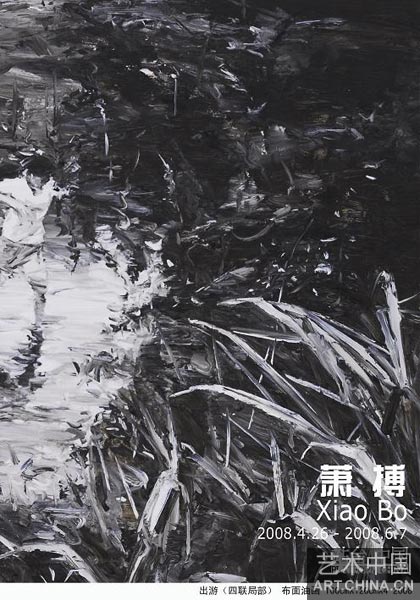
蕭搏個(gè)展
2008.4.26-2008.6.07
開(kāi)幕式:2008年4月26日下午15:00
展覽地點(diǎn):站臺(tái)中國(guó)當(dāng)代藝術(shù)機(jī)構(gòu)草場(chǎng)地主空間 B
策展人:凱倫·史密斯
長(zhǎng)期以來(lái),大師們也同樣為了如何在畫(huà)面中適當(dāng)安排各種元素從而形成最佳構(gòu)圖,為如何選擇一個(gè)相關(guān)的主題而絞盡腦汁,直到創(chuàng)作出滿意的作品。相比之下,我的創(chuàng)作只是依據(jù)任意的一連串的事物所提供給我的元素而成。
——藝術(shù)家語(yǔ)
蕭搏的早期作品, 主要取材于一些舊時(shí)代的老照片、電影片斷等,著重采納舉世聞名或人盡皆知的關(guān)于歷史事件以及領(lǐng)袖人物的圖片,運(yùn)用眾多圖像構(gòu)成的畫(huà)面來(lái)對(duì)某個(gè)瞬間進(jìn)行描述,從而展示人們所參與的瞬間的重要性,并使其定格而成為永恒。而他近期的作品,焦點(diǎn)從公眾人物和歷史轉(zhuǎn)化到涉及普通大眾的個(gè)體及人文環(huán)境:探究從重要的歷史事件到個(gè)人經(jīng)歷所帶來(lái)的影響。他將一個(gè)事件安置在一個(gè)一個(gè)的框架里進(jìn)行描述,一個(gè)瞬間是一部分,世界便在不停變換當(dāng)中,并且永遠(yuǎn)不同。對(duì)電影的涉獵,以及時(shí)間的流逝,即便短暫也一樣可以體現(xiàn)其對(duì)于歷史的特殊的影響。他的作品體現(xiàn)了對(duì)歷史和時(shí)間的細(xì)微而機(jī)敏的觀察,但離開(kāi)筆觸將會(huì)失色許多。作品也同樣有著抽象的痕跡在:表現(xiàn)形式都很簡(jiǎn)潔,用極少的線條描繪出更多的意境,看上去仿佛在畫(huà)布上雕塑一般。和眾多的平面化的中國(guó)當(dāng)代藝術(shù)相抗衡,有著如此厚重筆觸的作品總是令人有耳目一新的感覺(jué)。一句話,是內(nèi)容和技巧的絕妙結(jié)合。這些通過(guò)假想的視覺(jué)活動(dòng)而獲得的簡(jiǎn)單的畫(huà)面設(shè)置,使畫(huà)面變得栩栩如生,令人重新思考到底是什么構(gòu)成了我們的歷史。
他從書(shū)籍、雜志、互聯(lián)網(wǎng)甚至古玩市場(chǎng)獲得他所感興趣的人物面貌和特質(zhì)。在他簡(jiǎn)潔明了的畫(huà)面中,毛澤東、鄧小平等政治領(lǐng)袖的形象成為中國(guó)意識(shí)領(lǐng)域的代言和特殊符號(hào),他用抽象的手法、極少的線條,表達(dá)了更多的意境。繪畫(huà)帶給他的,從因創(chuàng)作而產(chǎn)生的興奮逐漸轉(zhuǎn)移到對(duì)新的表現(xiàn)方式的探討。他不滿足于視覺(jué)“游戲”,將焦點(diǎn)從色調(diào)和筆觸上抽離,揭偽取真,剔除擾亂視覺(jué)的色彩,更加關(guān)注情節(jié)——即瞬間,這恰恰使得觀者無(wú)需花費(fèi)很多時(shí)間就能看出畫(huà)面中人物之間的角色轉(zhuǎn)換。人們看作品也許只在第一眼就感覺(jué)畫(huà)面的力量,判斷作品的意義,都是暫時(shí)的經(jīng)驗(yàn)。
蕭搏的作品,正在超越繪畫(huà)本身的簡(jiǎn)單行為:表面的質(zhì)感,抽象的痕跡,色彩的選擇,形成了一個(gè)簡(jiǎn)明的復(fù)合體。當(dāng)人們都在關(guān)注悲劇、事故等敘述性的事情時(shí),生命的脆弱及嬗變,帶他回到他所感興趣的時(shí)間和瞬間,永不休止。他嘗試向人們展示繪畫(huà)的新可能性,使用多種畫(huà)布形成的場(chǎng)景讓人覺(jué)得任何事都可能發(fā)生,就好像讀一本書(shū),你永遠(yuǎn)不知道下一頁(yè)將發(fā)生什么。
For Immediate Release
SNAPSHOT!
XIAO BO SOLO EXHIBITION
APRIL 26 –JUNE 07, 2008
OPENING RECEPTION: SATURDAY APRIL 26, 2008, 3PM
VENUE: PLATFORM CHINA CONTEMPORARY ART INSTITUTE (MAIN EXHIBITION SPACE A & SPACE B IN CAOCHANGDI)
CURATOR: Karen Smith
Great masters wrestled for long periods of time with the arrangement of various elements of a composition, making decisions about one object relevant to another, until they achieved a satisfactory composition. By contrast, I composed my paintings according to the random sequence in which the elements presented themselves to me.
---Artist’s statement
Xiao Bo’s paintings draw largely upon old photographs and film clips. The early works focused primarily on known or familiar photographic images of historic events, and in particular, immediately recognizable political leaders. These images are then transformed into paint to represent a frame-by-frame analysis of an instant, a process during which the moment becomes as important as the individual people who are depicted participating in it, and even the event itself.
His recent works evidence a shift away from the focus on public persona towards the individual, both in terms of the human condition, and of situations concerning ordinary people. Here then, a move from the historical import of events past to the weight of past personal experience.
Xiao Bo’s use of a frame-by-frame sequence of paintings makes an obvious reference to film, to the passage of time—albeit short—and to the weight a minute can accrue in terms of its historic impact. This makes an extraordinarily powerful visual statement. But this statement would not be as powerful were it not for the nature and quality of the brushwork employed. This is perhaps the most delightful quality of Xiao Bo’s painting. The works take on an lyrical quality, even as the forms described are without question succinct, minimal, mapped out in highly efficient sweeps of line, almost as if Xiao Bo were sculpting figures and spaces on canvas. What Xiao Bo achieves is a marvellous combination of content and execution that both brings the paintings to life, and makes people think about how history is made.
In the new works produced for this exhibition, Xiao Bo’s paintings are moving beyond the simple act of painting. Emerging from his canvases we find a narrative of modern life, suffused with concerns for the tragedy that unfolds daily within the immediate social environment. Modern life sometimes feels so fragile. It changes abruptly from moment to moment, which brings Xiao Bo back to the fact of time, and how moments can change lives. The use of multiple canvases for each work creates a sense that anything can happen: “just like when reading a book you never know what’s going to happen on the next page.”
Please contact us for more information or any further images.
|

